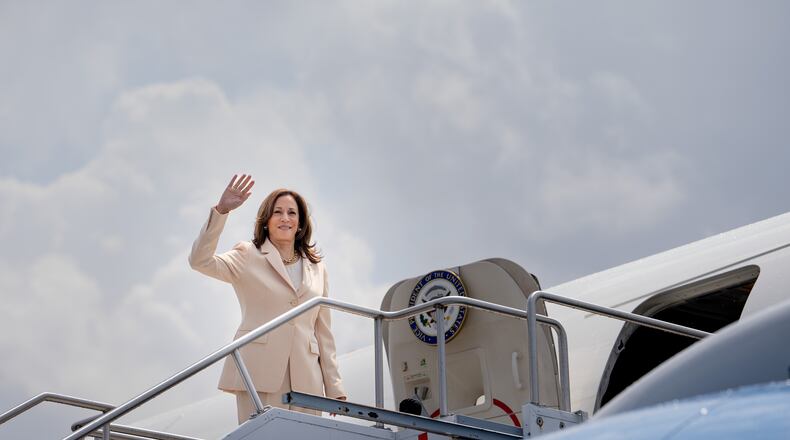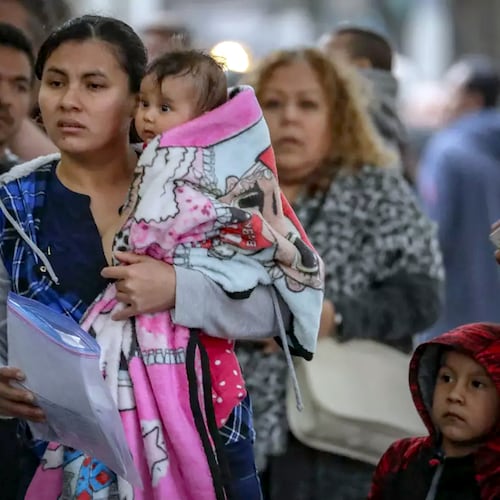On both sides of the political divide, we’ve heard the same thing repeated time and again: This is the most important presidential election of our lifetimes.
The stakes have never been so high, say some. Democracy is hanging in the balance, say others. Many believe America could be forever changed by the outcome of November’s election.
We are a deeply polarized nation right now. Still, for a large number of American voters, Joe Biden and Donald Trump were not the names they wanted to see on the ballot. People were uninspired by the rematch.
In an April Pew Research Center poll, nearly half of registered voters said that they would replace both candidates if they could.
Then, just like that, things changed. On July 21, Biden gave in to the barrage of calls for him to drop out of the race, then he endorsed Vice President Kamala Harris, a 59-year-old woman of Black and South Asian ancestry.
We don’t know yet if Harris will secure the Democratic Party’s nomination. We don’t know if her candidacy will energize voters who wanted to replace Biden and Trump. But we do know her gender will put her under a different type of scrutiny.
Harris isn’t the first woman to run for president. But she might be the first woman of color to become a nominee, and we have not yet confronted that intersectionality when electing the leader of this country.
When Americans elected Barack Obama, it was on the strength of his platform. But I wonder if Harris will be afforded the same consideration?
A couple of days ago, U.S. Rep. Tim Burchett, of Tennessee, described Harris as a “DEI (diversity, equity and inclusion) vice president.” Sebastian Gorka, of Newsmax, also referred to her as a “DEI hire.”
Is America really ready for this moment?
You can’t have a conversation about Harris’ prospects without also considering Hillary Clinton’s historic run for office, said Andra Gillespie, associate professor in the department of political science at Emory University.
There are the arguments that women are often held to a different standard than men. They must walk a line between being tough and compassionate, especially on issues related to women and families.
Back in 2016, when Clinton was campaigning, she told the blog Humans of New York, “I know that I can be perceived as aloof or cold or unemotional. But I had to learn as a young woman to control my emotions. And that’s a hard path to walk. Because you need to protect yourself, you need to keep steady, but, at the same time, you don’t want to seem ‘walled off.’”
Most Americans were willing to give her a shot. She won the popular vote by 2.9 million, but lost in the Electoral College. In conceding defeat to Trump, she told her supporters, “I know we have still not shattered that highest and hardest glass ceiling, but someday someone will, and hopefully sooner than we might think right now.”
Though we haven’t broken that glass ceiling, many other countries have.
In total, 59 United Nations member countries have had a woman as the head of government since 1960, when Sri Lanka became the first.
But some of us still can’t see past gender. In Harris’ favor is the fact that “Clinton has already kind of tilled the ground a bit,” Gillespie said.
Harris certainly has her own hurdles to overcome — polling numbers that are not much higher than Biden’s, a track record from her days as prosecutor that leaves some voters worried, and a tenure as vice president that has some would- be supporters wondering who she is and what she is capable of.
But already, she has racked up delegates, and campaign contributions have surged.
Should Harris become the democratic nominee, she will have to choose a running mate. Even though Gillespie tells me that, historically, vice presidential picks have minimal impact on election outcomes, it feels like another opportunity to offer Americans real change.
Consider the impact of a ballot with Harris and Michigan Gov. Gretchen Whitmer. Or Secretary of Commerce Gina Raimondo.
I can hear the boisterous laughter at these suggestions. Two women on one ticket? That would never happen in America, right?
But, as they say, if not now, then when?
We keep saying that we need to move the country in a radically different direction. If that’s really what we’re seeking, then maybe it’s time we do things in a radically different way.
Read more on the Real Life blog (www.ajc.com/opinion/real-life-blog/) and find Nedra on Facebook (www.facebook.com/AJCRealLifeColumn) and Twitter (@nrhoneajc) or email her at nedra.rhone@ajc.com.
About the Author
Keep Reading
The Latest
Featured


